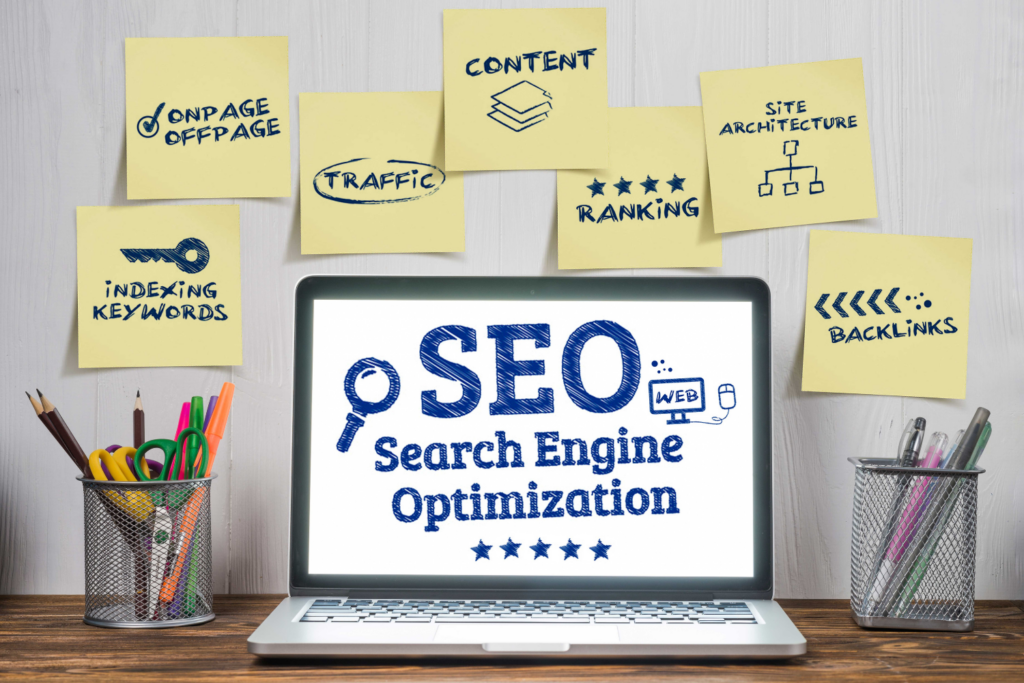With the cutthroat market of digital marketing, it becomes necessary to dominate on-page SEO to enhance your website’s visibility and channel organic traffic. On-page SEO is used to optimize web pages individually for better rankings in search engine result pages (SERPs) and to attract relevant visitors.
This is an analysis of the top 10 on-page SEO elements that will significantly influence your rankings in 2025.
1. Meta Title Tags
Why it matters: The title tag is the clickable heading in search engine results, and it affects search engine rankings and click-through rates (CTR).
Optimization tips:
- Place your top keyword at the start.
- It should be brief (50-60 characters).
- Make it compelling to drive clicks.
Example: “Top 10 Digital Marketing Strategies for Small Businesses”
2. Meta Descriptions
Why it matters: Though meta descriptions have no direct effect on rankings, they do impact CTR, which can increase your SEO performance.
Optimization tips:
- Make it 150-160 characters long.
- Integrate target keywords naturally.
- Make sure it’s clear and engaging.
Sample: “Learn the most effective digital marketing methods for small business, including SEO, social media, and content marketing.”
3. Header Tags (H1, H2, H3, etc.)
Why it is essential: Header tags are useful in organizing content, making it easier to read, and creating SEO hierarchy for search engines.
Tips on how to optimize:
- Use an H1 tag as the main title.
- Break content into H2 and H3 tagged sections.
- Organically include keywords in headers.
Example: H2: “The Importance of On-Page SEO for Business Growth”
4. URL Structure
Why it matters: A simple and keyword-enriched URL enhances user experience and informs search engines about the page’s topic.
Optimization tips:
- Use short and descriptive URLs.
- Add target keywords.
- Do not use random numbers or parameters.
Example: www.example.com/on-page-seo-tips rather than www.example.com/page1234
5. Optimized Content
Why it matters: Well-written content boosts your page’s ranking and retains readers.
Optimization tips:
- Perform keyword research and include applicable terms.
- Create long-form content (1,500+ words) for improved rankings.
- Benefit user intent and offer useful insights.
- Avoid keyword stuffing—utilize keywords naturally.
Example: Blog posts that provide in-depth answers to frequent questions, such as “How to Improve SEO for Local Businesses”
6. Internal Linking
Why it matters: Internal links enable search engines to crawl your site and retain users’ interest efficiently.
Optimization tips:
- Utilize descriptive anchor text that contains relevant keywords.
- Link to high-priority pages in a strategic way.
- Follow a logical site structure.
Example: Linking “Best SEO Practices” to “How On-Page SEO Affects Rankings”.
7. Image Optimization
Why it matters: Optimized images enhance page speed, maximize user experience, and enhance SEO rankings.
Optimization tips:
- Employ descriptive filenames (e.g., on-page-seo-guide.jpg).
- Add alt text for accessibility and keyword purposes.
- Compress images to save file space without compromising on quality.
Example: An image seo-checklist.png with alt text “SEO checklist for website optimization”.
8. Mobile-Friendly
Why it is important: Google’s mobile-first indexing requires your website to be mobile-optimized in order to rank well.
Optimization tips:
- Utilize a responsive design that can adjust according to various screens.
- Make it load quickly on mobile devices.
- Simplify the navigation for a smoother user experience.
Example: A site that adapts smoothly on desktop and mobile screens.
9. Page Speed
Why it’s important: A slow site increases bounce rates, decreases user interaction, and poor SEO ranking.
Optimization tips:
- Reduce HTTP requests by merging CSS and JavaScript files.
- Activate browser caching to enhance loading speed.
- Employ a Content Delivery Network (CDN) to deliver content efficiently.
Example: Utilizing tools such as Google PageSpeed Insights to test and optimize speed.
10. Schema Markup (Structured Data)
Why it matters: Schema markup gives search engines more context about your content, resulting in richer snippets (e.g., ratings, FAQs, event information).
Optimization tips:
- Generate schema code using Google’s Structured Data Markup Helper.
- Use schema on reviews, events, products, and FAQs.
- Validate your markup with Google’s Rich Results Test.
Example: A restaurant website that uses schema to show reviews and prices in search results.
Why On-Page SEO Matters
Having these on-page SEO techniques will enable your website:
- to rank better in search results pages (SERPs)
- to attract more organic traffic and website visits
- to enhance user experience (time spent on the site, CTR, dwell time)
- to grow brand credibility and authority
The more optimized your website is, the more visible to search engines and users.
How Ladhar Enterprise Can Guide You to become an On-Page SEO Master
Ladhar Enterprise is a top digital marketing agency in Nottingham, providing on-page SEO, Nottingham SEO services, and social media marketing Nottingham.
Personalized SEO Strategies: Plans tailored to your business objectives.
Expertise: Current with Google’s latest algorithm changes.
Complete Services: Keyword research to technical SEO audits.
Local Expertise: Expertise in Nottingham SEO services for small, medium, and large businesses.
Our SEO Services Include:
✔ Title tag, meta description, header, and URL optimization.
✔ Uncovering deep keyword insights for specific content plans.
✔ Enhancing site speed and mobile responsiveness for improved user experience.
✔ Executing internal linking techniques to enhance site navigation.
Ready to Boost Your Website’s Rankings?
Mastering these on-page SEO elements can dramatically improve your search engine rankings and organic traffic. Yet expert advice is essential to execute them effectively.
Ladhar Enterprise is here to help!
Contact us today to elevate your SEO strategy and dominate search rankings!

